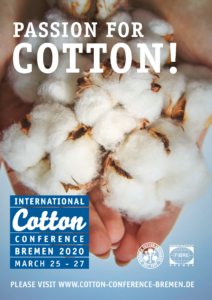Interview with Elke Hortmeyer, Bremer Baumwollbörse and Axel Drieling, Faserinstitut Bremen.
 From 25 to 27 March 2020, Bremen will once again, as every two years, be the centre of the global cotton industry. Under the motto ‘Passion for Cotton!’ and embedded in a week dedicated entirely to cotton, the International Cotton Conference will take place in the Hanseatic city’s historic Town Hall. The conference is organised by the Fibre Institute Bremen (FIBER) and the Bremen Cotton Exchange. The editors of the Bremen Cotton Report spoke to Elke Hortmeyer, Director of Communications and International Relations at the Cotton Exchange, and Axel Drieling, Senior Manager Cotton at the Fibre Institute, about the highlights of next year’s conference.
From 25 to 27 March 2020, Bremen will once again, as every two years, be the centre of the global cotton industry. Under the motto ‘Passion for Cotton!’ and embedded in a week dedicated entirely to cotton, the International Cotton Conference will take place in the Hanseatic city’s historic Town Hall. The conference is organised by the Fibre Institute Bremen (FIBER) and the Bremen Cotton Exchange. The editors of the Bremen Cotton Report spoke to Elke Hortmeyer, Director of Communications and International Relations at the Cotton Exchange, and Axel Drieling, Senior Manager Cotton at the Fibre Institute, about the highlights of next year’s conference.
Cotton Report: The motto of the next Cotton Conference is ‚Passion for Cotton‘. What is behind the choice of topic?
 Axel Drieling: What connects people in our industry is their passion for cotton. With the motto of the conference and the corresponding content orientation, we aim to fill this with life. We appeal to professionals from all areas of the supply chain whose common ground is the passionate use of cotton. We expect up to 500 participants from all continents. Science and practical experience are equally represented.
Axel Drieling: What connects people in our industry is their passion for cotton. With the motto of the conference and the corresponding content orientation, we aim to fill this with life. We appeal to professionals from all areas of the supply chain whose common ground is the passionate use of cotton. We expect up to 500 participants from all continents. Science and practical experience are equally represented.
How has the focus of the conference changed compared to previous years?
Elke Hortmeyer: As a matter of principle, when it comes to choosing the main topics, we orient ourselves ‘with an ear to the ground’ on current market developments and issues within the value chain and scientific research. In the past, the focus tended to be more on technical questions in the area of quality and processing. In the meantime, the scope of the meeting has expanded and includes, for example, other stages of the supply chain, innovative cotton products and issues of transparency and traceability. In addition to cotton producers, traders and employees of immediate downstream stages such as spinning and weaving mills, recent events have also welcomed more visitors from the textile and clothing industry, textile wholesalers and the retail trade, as well as their associations.
What is the current hot topic in the cotton world and how will it be represented at the conference?
Axel Drieling: A much-discussed subject within the industry is ‘circular economy’. In the sense of a circular economy we are talking about the natural raw material cotton and its life cycle. Following a ‘cradle to cradle’ process, it goes from its natural source through various stages of processing and use and then, at the end of this, it is returned to the cycle for use in new products. This involves different forms of production, further processing and reusability, for example through recycling, with the aim of conserving resources and avoiding non-degradable waste.
What does this mean for the thematic structure of the conference and its sessions?
Axel Drieling: Keynote speeches by recognised speakers on the status quo and the challenges in the industry form the prelude to the conference. One thematic block deals with aspects of cotton breeding and production, including ginning in different growing regions, improving cotton quality and testing, as well as the cotton trade and textile production processes such as spinning, weaving and finishing. Other topics include innovative cotton-based textile products for technical applications, as well as sustainable supply chain issues. Finally, as part of an expert session, there is an in-depth, scientific examination of selected areas of cotton cultivation and processing. On a side note, the spinning and textile seminar organised by FIBER, BBB, ITMF and IVGT on Tuesday 24 March 2020 which deals with questions of cotton quality along the value chain, also goes into the technical details.
For the first time, a guest nation will present itself at the next conference. What were the reasons for choosing Ethiopia?
Axel Drieling: We have selected a country where cotton is produced and processed at the same time. With Ethiopia as our guest nation, we are focusing our attention on a developing or emerging country where much has been achieved. Ethiopia‘s transformation through politics and predominantly foreign investments around the textile industry will be analysed more closely. It is exciting to see which levers are bringing about change in the country and what conclusions can be drawn from this.
This time, there will also be a Young Professionals Programme. What is the idea behind this?
Elke Hortmeyer: In short, we want to reach and inspire young people for the raw material cotton, true to our conference motto. The programme is tailored to the needs of the participants and is aimed at people under the age of 35 with less than eight years‘ professional experience in the industry. They can be working in the cotton or textile industry or textile research, have just finished, or be about to finish their studies or be still in training. This creative seminar provides an opportunity for exchange and discussion with specialists from all stages of the value chain.
As part of the Cotton Week, the Weser-Kurier is once again organising the SUSTAIN conference, in close cooperation with the Bremen Cotton Exchange. What is the topic this time?
Elke Hortmeyer: SUSTAIN takes place on Tuesday, March 24 and is a conference on sustainability issues in production, consumption and trade. This time the focus is on ‘city and trade – the future of the textile retail’. The conference’s crucial questions are: What do consumers expect from textile retailers today and in the future? What role do the attractiveness and the mix of offerings play in the inner cities? How can stationary trading benefit from digitalisation? In a varied mix of keynotes and panels, we will look for, and discuss, answers and solution models. With this thematic focus, we are expanding the perspective of the Cotton Conference beyond the first stages of the textile supply chain to the consumption of textile products by the end customer.
What is special about the Bremen Cotton Conference?
Elke Hortmeyer: In addition to the extensive programme content of the conference, the combination of research and practice and SUSTAIN, the additional meetings in the ‘Cotton Week’ are an added attraction. Last but not least, the traditional Bremen Cotton Night in the cellar rooms of the Town Hall, the ‘Ratskeller’, invites participants to network in a relaxed atmosphere.
Thank you for the interview!
Further information can be found on the conference website www.cotton-conference-bremen.de/

